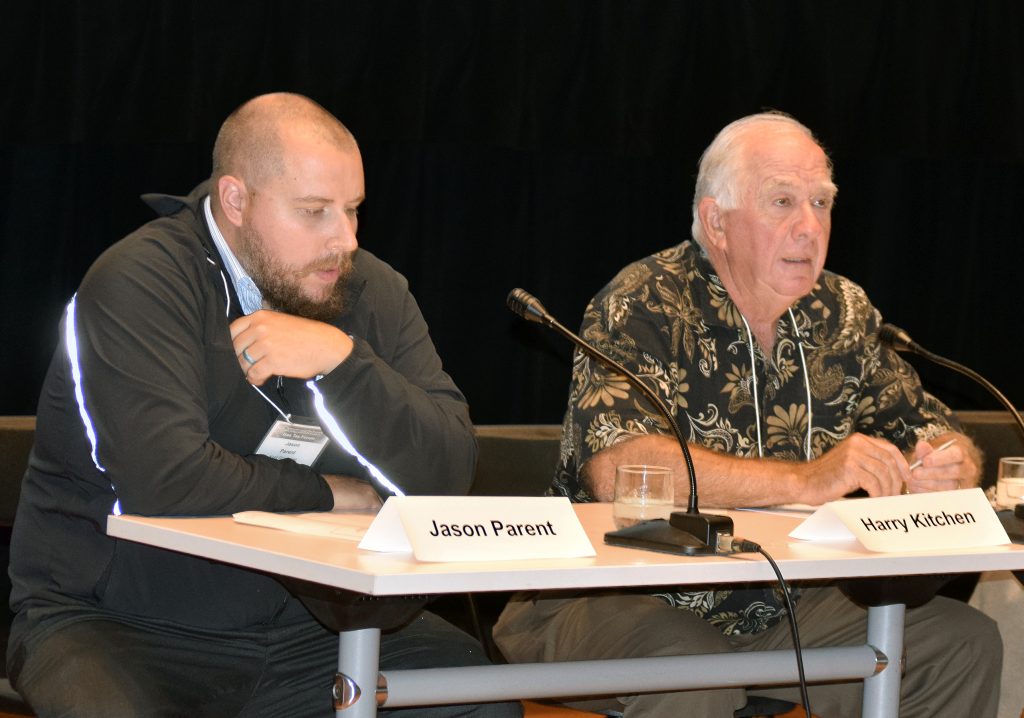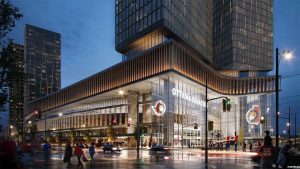The pledge of Ontario’s new Progressive Conservative government to lower gas taxes by 10 cents a litre was called regressive and counter-productive to efforts to reduce congestion and fund new transit infrastructure by speakers addressing a recent Toronto transit forum.
The effects of the gas tax cut were assessed by experts from the worlds of academia, business, the non-profit sector and construction advocacy during a four-hour session of presentations and panel discussions hosted by transit advocates Transport Futures.
The Doug Ford government plan was dissected against a backdrop of carbon policy instability that includes the government’s scrapping of the province’s cap and trade system and the impending imposition of a replacement carbon policy regime by the federal government.
Panellist Jason Parent of the Kent Group said it was uncertain how much additional personal vehicle use would be stimulated by a drop in costs — studies of price elasticity have drawn different conclusions in different jurisdictions.
In Vancouver, when gas prices shot up due to various factors including a hike in the provincial carbon tax, “demand fell off a cliff,” he said.
Parent estimated the Ontario government would be looking at a drop in revenues of about $1.5 billion per year with the cuts, about $300,000 more than some have estimated, noted Transport Futures founder Martin Collier.
Commented Parent, “I am going to leave it to people smarter than me to figure out how they are going to make up the loss of $1.5 billion in their budget.”
Collier and other speakers such as Andy Manahan, executive director of the Residential and Civil Construction Alliance of Ontario, Trent University professor emeritus Harry Kitchen and North Vancouver District Mayor Richard Walton advocated for sophisticated mobility pricing strategies to encourage commuters to take public transit or to take advantage of such alternatives as carpooling, bike-sharing and cycling.
Kitchen said the gas tax decision by the new Ontario government was a step in the wrong direction.
“It’s going backwards,” he said in an interview. “I think there are two issues. You need the revenues to fund the services, and you need to change the pattern of behaviour. You’ve got to get fewer people driving, because of the externalities they cost — the congestion cost, the accidents cost, lost productivity.”
The cut will consist of a 5.7-cent reduction to the existing 14.7-cents-per-litre gas tax as well as the elimination of the 4.3-cent-a-litre carbon tax.
Collier explained he called for the forum right after the election of the new government on June 7 to acknowledge a new era of dialogue on transportation funding. His forums had previously debated mobility pricing mechanisms such as the province’s High Occupancy Toll lanes, parking fees and transit fares, with any discussions of gas taxes arguing they should go up.
“We never thought they would go lower, so we say that is the wrong way to go. We’ve got to keep that money for other reasons, mainly for infrastructure. It represents $1.2 billion, Jason said $1.5 billion, and so they have to make that up somehow, and how are they going to do that,” said Collier.
Besides the gas tax, further uncertainties were raised across a broad spectrum of issues. Manahan noted the Ontario government had announced in January 2017 it would gradually increase the municipal share of gas tax funds from two cents to four cents per litre by 2021-2022, to be reinvested in municipal transit. It’s uncertain whether the new government will adhere to the policy.
As for the wind-down of cap and trade, panellist Alejandro Carrillo of carbon-market consultants ClearBlue Markets said the marketplace was anxiously awaiting details from the government. He was speaking while Ontario Environment Minister Rod Phillips was addressing a news conference across town on the topic after legislation had been tabled. Stakeholders commenting after the news conference said there still remained questions about compensation for allowances purchased.
Carrillo also led a discussion of the federal Backstop policy. The carbon pricing system will be applied in jurisdictions, Ontario soon to be among them, that do not have policies that align with federal benchmarks.
The Backstop would take effect in Ontario next Jan. 1.
“This cap and trade, I never knew it was so complicated,” said Kitchen.
“I don’t know why we are going through the incredible cost and uncertainties and complications that seem to be surfacing to have another system put in place. It seems pretty clear the Ontario government is going to lose its Supreme Court case, the feds are going to put this in. It doesn’t make any sense to me.”
North Vancouver’s Walton, who is also board chair of the regional transit agency TransLink, was introduced as a progressive voice advocating for mobility pricing. He said in an interview he felt Vancouver-area residents would be ready for new mobility strategies in the not-too-distant future.
“Traffic volumes in Vancouver are going to continue to get heavier and I think it will reach a point where people are going to realistically be looking at solutions a little longer and a little more seriously than right now,” he explained.
“Right now, there is a political risk associated with increasing any tax or cost, but that may shift to the point where there is political risk to not coming up with any potential solution. I think we are five years away from that.”











Recent Comments
comments for this post are closed